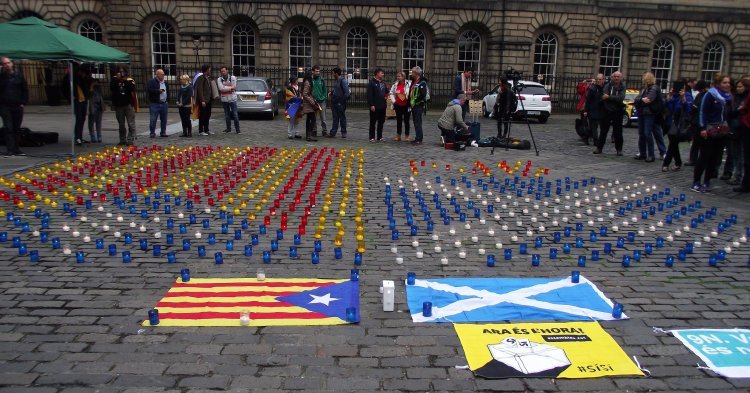Though it was tight, the British government’s strategy produced the desired result in the referendum, and enthusiasm for independence in Scotland seems to have subsided. In Spain, the violence during the voting day was one of the darkest moments in recent national history, and the country is in a continued state of chaos.
Long-standing tensions spilled over in Barcelona on October 1st as fierce clashes between police and the ‘independistas’ left at least 893 injured, with many comparing the oppressive tactics to those of fascist, Franco-era Spain. One man lost an eye after being shot with a rubber bullet, and videos of riot police attacking protesters with nightsticks made global prime-time news.
Spanish President Mariano Rajoy defended the Police, citing constitutional law. He stated once again that the referendum would not be legally recognised: ‘There was no self-determination referendum today’. ‘The rule of law remains in force with all its strength.’ Even King Felipe has condemned the referendum.
Regardless of the legality of the plebiscite, it has been a PR disaster for Rajoy’s government. Amnesty International denounced ‘the excessive use of force’ by the police, and the following morning newspapers worldwide led with images of riot police beating voters.
The leader of Catalan government, Carles Puigdemont, declared independence on Wednesday (10/10), before suspending his decision, saying he was open to dialogue. Rajoy has asked Puigdemont to clear up the confusion surrounding his comments, and announced he will be invoking Article 115 of the Spanish Constitution, which would allow Madrid to take charge of the regional administration. Spain is hurtling towards an all-out constitutional crisis.
Instead of trying to quell such movements by brandishing the constitution and resorting to force, recent history shows that concessions, in the form of a referendum, seem — perhaps counter-intuitively — to be a more effective way for a ruling government to see off the challenge of secessionism.
While comparisons between the two situations are limited by culture and context, both the Scottish and the Catalan independence movements claim their legitimacy through their history: they have both been (or see themselves as having been) sovereign in the past. And when a group that considers itself a nation believes independence is inevitable, they are only galvanised by state violence, the use of which detracts from the government’s legitimacy.
The effects of devolving powers are limited. Just as in 2006 Spanish Prime Minister José Luis Zapatero allowed Catalonia to adopt measures granting more autonomy, the British government has given Scotland control of significant areas over the years; from Agriculture to Health, from Education to Housing. But in neither instance were the measures enough to mollify the separatists. At a certain point in both cases, a referendum — legal or not –became unavoidable.
The Scottish National Party’s landslide victory in the 2011 Scottish parliamentary elections was the catalyst. The following year, Conservative leader David Cameron signed the Edinburgh agreement, giving his approval for a single-question vote on independence to take place in 2014. He believed that refusing a referendum would have led to ‘a divisive and disastrous battle’ between Westminster and Holyrood: ‘You voted for a party that wants independence,’ he said, ‘you should have a referendum that is legal, that is decisive and that is fair.’ It was up to the SNP to convince voters to take the plunge, and Cameron’s government to persuade them not to.
It was a huge risk, but calling the referendum meant that even if it was a political calculation, Cameron and his Conservative government could portray themselves as respectable democrats, which is more than can be said for Rajoy’s Popular Party in Spain today.
Three years after Scotland narrowly voted to remain in the Union, many Scots seem to have lost their appetite for independence. First Minister — and leader of the SNP — Nicola Sturgeon floated the idea of a second independence referendum in the run-up to the British general election this June, and the SNP wound up losing a third of its seats in Scottish parliament. In a recent interview with The New Statesman, Sturgeon admitted she was ‘not considering any further the question of a second referendum at this stage.’ For the time being, secession has been shelved.
Sturgeon’s resignation owes a lot to the framing of the referendum, and for that, the Tories have former SNP leader Alex Salmond to thank. By calling the vote a ‘once in a generation opportunity’ in an effort to galvanise voters, he inadvertently ensured that Westminster could deny the legitimacy of another such plebiscite for years. So when earlier this year Sturgeon pushed for another referendum, Theresa May could to flat out deny it. Judging by the SNP’s disappointing election, and the impressive showing of Ruth Davidson’s Scottish Conservatives, her denial was justified.
Though Cameron was to later regret gambling on another referendum (see Brexit), this one paid off, — albeit narrowly. According to polling expert Professor John Curtice, when the referendum was first announced, roughly 35 percent of Scots wanted independence. Towards the end of the campaign, however, the polls became dramatically close. The pro-independence movement won supporters by arguing that ridding Scotland of meddling Conservative austerity would create a fairer society, whereas the Better Together unionists were criticised for their fear-mongering and negativity. On the day, Scotland voted to remain in the UK by 55.3 percent to 44.7.
Before Sunday’s vote in Spain, various polls showed that a majority of Catalans wanted a chance to vote on the future of the region. And yet annual surveys conducted by the Spanish sociology research centre CIS — quoted in Politico — show that the percentage of Catalans wanting independence has been in decline since 2013. According to the CIS, the figure sat between 30-35 percent before the referendum.
It may have been close, but a legal vote in Catalonia would by no means been a guaranteed win for Puigdemont and his supporters. Though ‘Yes’ received 90 percent of the vote, this figure represents just 42.3 percent of eligible voters, according to regional government spokesman Jordi Turull. The Catalan unionist parties chose to boycott the referendum.
But the arrests, seizure of ballot papers and police attacks may have inadvertently swelled the ranks of the ‘independistas:’ many Catalans reportedly changed their minds on the day of the vote. One young voter told L’OBS that she had left the house planning to vote against independence, but ended up voting ‘Yes,’ because she felt she couldn’t identity with the government’s repressive tactics: ‘We’ve reached a point of no return,’ she said.
Accepting a referendum entails massive risks: polls can only be trusted up to a certain point, and public opinion can be wildly unpredictable, and influenced in countless ways. A miscalculation can be catastrophic for politicians’ careers, and cruel on the losing side — just ask the 48 percent of Britons who voted to remain in the EU. It can be both incredible fickle and brutally absolute. But however frustrating, considering the alternatives, a plebiscite is sometimes the only option. And rightly or wrongly, the referendum is seen as the purest form of direct democracy.
The results of the British and Spanish governments’ handling of the secession movements are telling. Cameron accepted a referendum, his gamble paid off and three years on the SNP have learnt the hard way that the ‘I’ word is not to be mentioned. Rajoy refused to entertain the notion of a referendum, and denied the Catalan independence movement democratic legitimacy. He now finds himself in a position where allowing a vote would be seen as giving in to the illegal actions of Catalan parliament, but continuing to deny it will necessitate the use of force, which will mean further scandal, cause more damage to the already damaged relationship between Barcelona and Madrid, and ultimately, continue to aggravate the already painful divide between Catalonia and the rest of Spain.
Frank Andrews is the Editor-in-Chief of The PanEuropean.


Follow the comments: |
|
